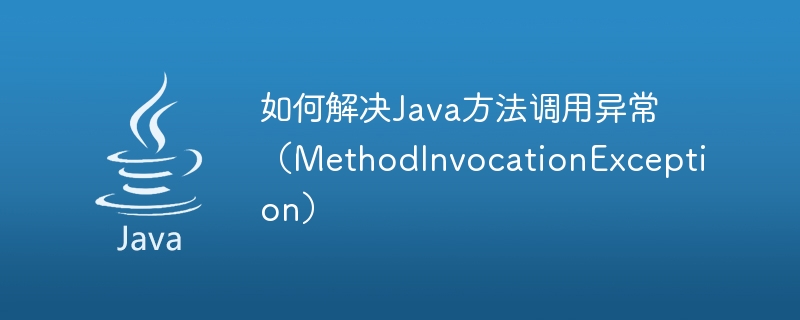Home >Java >javaTutorial >How to solve Java method invocation exception (MethodInvocationException)
How to solve Java method invocation exception (MethodInvocationException)
- WBOYWBOYWBOYWBOYWBOYWBOYWBOYWBOYWBOYWBOYWBOYWBOYWBOriginal
- 2023-08-18 17:21:141727browse

How to solve Java method invocation exception (MethodInvocationException)
In Java programming, we often encounter various abnormal situations. One of the common exceptions is "MethodInvocationException", which usually occurs during method invocation and may cause the program to fail or cause an error. This article explains how to resolve this exception and provides some code examples.
MethodInvocationException is an exception thrown by the Freemarker template engine. It indicates that an error occurred when calling a Java method in the template file. When we call a method in a template file, if an exception occurs in the method, Freemarker will catch and throw the exception in the form of MethodInvocationException.
The method to solve this exception mainly includes the following steps:
- Determine the cause of the exception: First, we need to clarify the specific cause of the exception. Usually, MethodInvocationException contains the root exception (Root Cause). We can understand the specific problem of the exception by viewing the description information of Root Cause.
- View the exception stack trace (Stack Trace): The exception stack trace is a record of a series of method calls, tracing back from the fundamental exception to the starting point of the method call. By viewing the exception stack trace, we can locate the line of code that caused the exception and solve the problem.
- Check method call parameters: In some cases, MethodInvocationException may be caused by problems with method call parameters. We need to carefully check whether the parameters of the method call meet the requirements of the method definition, such as whether the parameter type is correct, whether the parameter is empty, etc.
The following is a sample code that demonstrates how to solve the MethodInvocationException exception:
public class Example {
public String hello() {
return "Hello, World!";
}
public static void main(String[] args) {
Configuration configuration = new Configuration(Configuration.VERSION_2_3_30);
try {
configuration.setClassForTemplateLoading(Example.class, "/");
Template template = configuration.getTemplate("example.ftl");
Map<String, Object> data = new HashMap<>();
data.put("example", new Example());
StringWriter writer = new StringWriter();
template.process(data, writer);
System.out.println(writer.toString());
} catch (IOException e) {
e.printStackTrace();
} catch (TemplateException e) {
if (e instanceof MethodInvocationException) {
Throwable cause = ((MethodInvocationException) e).getCause();
System.err.println("Root Cause: " + cause.getMessage());
cause.printStackTrace();
} else {
e.printStackTrace();
}
}
}
}In the above sample code, we called the hello method of the Example class in the template file example.ftl. If an exception occurs during the method call, we will output the exception information on the console and print the stack trace of the underlying exception.
Through the above steps, we can better understand and solve the MethodInvocationException exception. When we encounter such an exception, we first need to determine the cause of the exception and carefully look at the stack trace of the exception. Then, we can check whether the parameters of the method call are correct, and check and modify the code logic of the call. Finally, we can perform corresponding debugging and repair work based on the exception information.
The above is the detailed content of How to solve Java method invocation exception (MethodInvocationException). For more information, please follow other related articles on the PHP Chinese website!
Related articles
See more- What is the Java Virtual Machine (JVM) and how does it work?
- How does Java's garbage collection work and how can I optimize it?
- What are the best practices for multithreading and concurrency in Java?
- How can I improve Java application performance through profiling and tuning?
- How do Java's concurrency utilities (Executors, Locks, Atomic Variables) work?

